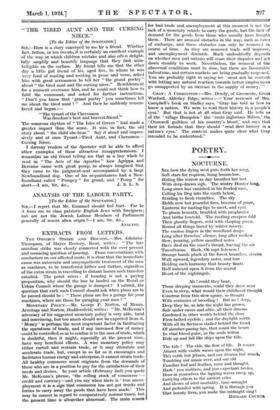EXTRACTS FROM LETTERS.
THE OMNIBUS STRIKE AND HOUSING.—MIS. Gilchrist- Thompson, of Hayes Rectory, Kent, writes : " The late omnibus strike was closely connected with the ever present and menacing question of housing. From conversations with conductors on our affected route, it is clear that the immediate cause was autocratic and unsympathetic treatment of the men as machines, to be transferred hither and thither, regardless of the extra strain in travelling to distant homes such transfers entailed. The point arises : if housing is not a paying proposition, why should the loss be landed on the Rural or Urban Council where the garage is dumped ? I submit, the question that each such Council should ask when plans are to be passed should be : " These plans are for a garage for your machines, where are those for garaging your men ? "
MONETARY POLICY.—Mr. George P. Norton, of Messrs. Armitage and Norton, Huddersfield, writes.: "Mr. McKenna's advocacy of his suggested monetary policy is very able, lucid and convincing, but too much should not be expected from it. ' Money. ' is perhaps the most important factor in facilitating the operations of trade, and if any increased flow of money -could be controlled so as to confine it to the uses of trade, which is doubtful, then it might, especially at the present time, have very beneficial effects. A wise monetary policy may either curtail and restrain trade, or it may stimulate and accelerate trade, but, except in so far as it encourages and facilitates human energy and enterprise, it cannot create trade. All healthy commerce must originate from the demands of those who are in a position to pay for the satisfaction of their needs and desires. In your article (February 2nd) you quote Mr. McKenna's phrase, `the rolling stock of commerce '- credit and currency—and you say when there is ' true unem- ployment it is a sign that commerce has not got trucks and lorries to carry away the goods that have been made.' This may be correct in regard to comparatively normal times, but the present time is altogether abnormaL The main reason
for bad trade and unemployment at this moment is not the lack of a monetary vehicle to carry the goods, but the lack of demand for the goods from those who usually have bought them. There are unusual obstacles in the way, such as •rates of exchange, and these obstacles can only be removed in course of time. As they are removed trade will improve, and unemployment diminish. Much undoubtedly depends on whether men and nations will cease their disputes and get down steadily to work. Nevertheless, the removal of titer abnormal conditions must be slow, but there are favourable indications, and certain markets are being gradually reopened. You are probably right in saying we ' must not be content with letting any natural reaction towards better employment go unsupported by an increase in the supply of money.' " GRAY: A CoarteerroN :—Mrs. Dendy, of Greeneote, Great Warford, Alderley Edge, writes :—" Your reviewer of Mrs. Campbell's book on Shelley says, ' Gray has told us how to. know a nation. We were to read their history in a people's eyes.' But that is not at all what Gray said. He tells us of the ' village Hampden ' the ' mute inglorious Milton,' the ' Cromwell guiltless of his country's blood,' and says that their lot forbade that they should ' read their history in a nation's eyes.' The context makes quite clear what Gray intended to be understood."










































 Previous page
Previous page